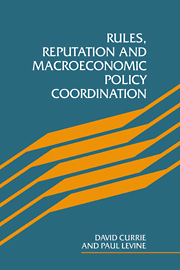Book contents
- Frontmatter
- Contents
- Acknowledgements
- Introduction
- Part I General issues
- Part II Theory and methodology
- Part III Fiscal and monetary policy in interdependent economies
- 8 Macroeconomic policy design in an interdependent world
- 9 Does international macroeconomic policy coordination pay and is it sustainable?: a two-country analysis
- 10 International cooperation and reputation in an empirical two-bloc model
- 11 Fiscal policy coordination, inflation and reputation in a natural rate world
- 12 The use of simple rules for international policy coordination
- 13 Evaluating the extended target zone proposal for the G3
- Bibliography
- Index
8 - Macroeconomic policy design in an interdependent world
Published online by Cambridge University Press: 03 December 2009
- Frontmatter
- Contents
- Acknowledgements
- Introduction
- Part I General issues
- Part II Theory and methodology
- Part III Fiscal and monetary policy in interdependent economies
- 8 Macroeconomic policy design in an interdependent world
- 9 Does international macroeconomic policy coordination pay and is it sustainable?: a two-country analysis
- 10 International cooperation and reputation in an empirical two-bloc model
- 11 Fiscal policy coordination, inflation and reputation in a natural rate world
- 12 The use of simple rules for international policy coordination
- 13 Evaluating the extended target zone proposal for the G3
- Bibliography
- Index
Summary
Introduction
Although most of the literature on macroeconomic policy design has focused on policy questions in the single open economy, there is an important strand that is concerned with the issues raised by interdependence between economies (see, for example, Hamada and Sakurai, 1978; Hamada, 1979; Canzoneri and Gray, 1983; Cooper, 1985; Corden, 1983; Miller and Salmon, 1985a, 1985b; Sachs, 1983; and Turner, 1983, 1984). This literature emphasises the game-theoretic, strategic aspect of policy-making in the international arena, and the prospect that non-cooperative forms of policy, arising from the elements of externality in the effects of policy internationally, may lead to outcomes markedly inferior to those of cooperative policies.
As Corden (1983) notes, analytical tractability has limited this analysis to static models, or to dynamic models with rather rudimentary dynamics, or to the neglect of the longer-run dynamics by focusing only on short-run outcomes. In view of the complexities of the interactions between countries, whether through prices, real demands, asset prices or the flow of funds, this neglect of dynamics is a clear limitation. In this chapter, we seek to overcome it by examining policy interactions and interdependence in a stochastic rational expectations model with developed dynamics within a framework that considers both the short- and longer-run effects of policy.
In the arena of policy debate, there has been evident the objective of formulating policy in terms of simple rules.
- Type
- Chapter
- Information
- Rules, Reputation and Macroeconomic Policy Coordination , pp. 213 - 246Publisher: Cambridge University PressPrint publication year: 1993
- 3
- Cited by



